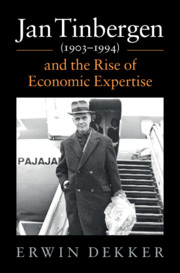Book contents
- Jan Tinbergen (1903–1994) and the Rise of Economic Expertise
- Historical Perspectives on Modern Economics
- Jan Tinbergen (1903–1994) and the Rise of Economic Expertise
- Copyright page
- Dedication
- Contents
- List of Figures/Tables
- Preface
- Acknowledgments
- Part I Becoming an Economic Expert
- Part II The Years of High Expertise
- Part III Global Expertise
- Part IV The Limits of Expertise
- 17 Measuring the Unmeasurable
- 18 Governing the Ungovernable
- 19 Expert or Idealist?
- Bibliography
- Index
- Series page
18 - Governing the Ungovernable
Can We Govern the Planet?
from Part IV - The Limits of Expertise
Published online by Cambridge University Press: 11 June 2021
- Jan Tinbergen (1903–1994) and the Rise of Economic Expertise
- Historical Perspectives on Modern Economics
- Jan Tinbergen (1903–1994) and the Rise of Economic Expertise
- Copyright page
- Dedication
- Contents
- List of Figures/Tables
- Preface
- Acknowledgments
- Part I Becoming an Economic Expert
- Part II The Years of High Expertise
- Part III Global Expertise
- Part IV The Limits of Expertise
- 17 Measuring the Unmeasurable
- 18 Governing the Ungovernable
- 19 Expert or Idealist?
- Bibliography
- Index
- Series page
Summary
Chapter 18 analyzes his work after his retirement in Rotterdam, in particular, on international governance. The first part of the chapter demonstrates that in response to frustrated attempts to further integrate the international community, Tinbergen became more radical and ambitious. He promoted a global government and international order along the lines of the developments that had taken place at the national level. He became more critical of the short-sightedness of both political leaders and voters and grew more critical of democracy. The second part of the chapter analyzes the underlying perspective of Tinbergen about the fallibility of man and the need for economic order. His view of humans is shaped by his Protestant, in particular, Remonstrant, beliefs, and he believed that (economic) order in the form of rules and institutions was required because humans are flawed. Harmony and peace must be actively constructed. The chapter suggests that next to a deep-seated sense of responsibility there is an element of fear in Tinbergen’s outlook. In his later works these fears and worries come more into the foreground, and he became pessimistic about the future, but he tried to remain hopeful.
- Type
- Chapter
- Information
- Jan Tinbergen (1903–1994) and the Rise of Economic Expertise , pp. 393 - 413Publisher: Cambridge University PressPrint publication year: 2021

